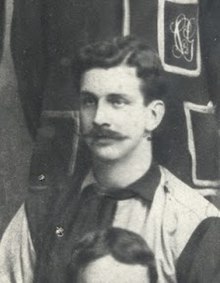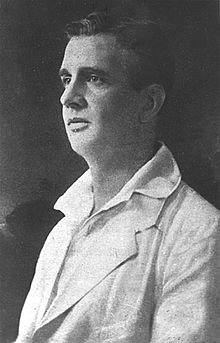Hermann Friese (soccer player)
Georg Paul Hermann Friese (born May 30, 1882 or May 22, 1880 in Hamburg , † October 1945 in São Paulo ) was a German-Brazilian football player , athlete and referee . He is considered to be the outstanding player of the early days of Brazilian football, has twice won championship honors and was multiple top scorer. In 1903 the newspaper O Estado de São Paulo described him as "the most sensational footballer of all time".
Track and field athlete and soccer player
Friese had already achieved fame as a track and field athlete in Europe and won the German championship in the 1,500-meter run in 1902 . In May 1907 he was the only athlete from Brazil to take part in an international competition in Uruguay , the so-called International Olympic Games of Montevideo , and won the 1,500 meter and 800 meter competitions in a single evening . He finished second over 400 meters . As a football player he was active in Hamburg until October 1902 for SC Germania 1887, a predecessor club of Hamburger SV , and then with DFC Prague .
Friese emigrated from Germany to Brazil in 1903 and joined the football club SC Germânia founded by Hans Nobiling in São Paulo , which had mainly German members. Like Friese, Nobiling had played in Germany at SC Germania 1887, whose name and club colors were taken over by SC Germânia. Friese made his debut on the first match day of the 1903 championship of São Paulo , first on June 11 as a referee in the game between the Mackenzie College team against last year's champions São Paulo Athletic Club and then on June 21 as a player in the 1-1 draw at Germânia against SC Internacional , in whose founding Hans Nobiling was also involved. On August 3, he scored his only two goals of the season in the 3: 4 defeat against Internacional for the team, whose support was in the defense of the club's founder Nobiling. Germânia finished the season in fifth and thus last and was again fifth in the next championship, but with six participants in the round.
In 1905 Germânia was runner-up in São Paulo and Friese with 14 goals in ten games, top scorer of the Liga Paulista de Foot-Ball . In 1906 and 1907 he was again top scorer with six goals each, although in those years he had to share the title with the Germânia teammate Filler and once with Léo from SC Internacional. In 1906 he was also the first time master of São Paulo with the club. In 1915, Germânia won the championship again, albeit after the split of most of the top clubs to the APEA, the Associação Paulista de Esportes Atléticos , in the weaker league.
On July 30 of the following year, Friese played his last championship game in the 4-0 defeat of Germânias against SC Americano ; thereafter, Germânia retired because of the First World War from the current competition and should not return to the league until 1921.
According to contemporary sources, Hermann Friese always played where he could be most useful to the team. The tall, sturdy Frieze was known for his body-hugging game - which not only earned him sharp scolding from opponents, but also earned him the nickname “sledgehammer” ( marreta ). In addition to his hardness, he is also awarded dribbling skills and good ball handling.
At the Germânia, where the later exceptional footballer Arthur Friedenreich had his first competitive experience in 1909 and 1911 , Friese also acted as a coach.
referee
Hermann Friese was also widely recognized as the “first big name in São Paulo refereeing”. For example, he led the playoffs of the São Paulo championship in 1903, 1904, 1910 and 1920 as well as the final of the Troféu Interestadual 1910, the Botafogo FC from Rio in the Velódromo of São Paulo with 7-2 against the home team of AA das Palmeiras won. It was quite common at the time for players to act as referees in other games.
His leadership of the 1903 playoff between the São Paulo Athletic Club and CA Paulistano caused a sensation when he whistled the second half after 28 minutes, instead of the regular 35 minutes at the time, at a score of 2-1 for the SPAC . Friese felt his safety threatened after the Paulistano players protested strongly about what they considered to be an unjustified penalty decision. The association recognized this as a mistake, but upheld the result.
In 1904 he led the re-edition of the decider from the previous year, in which the SPAC again had the upper hand, this time 1-0, and in 1910 he overlooked the game between AA das Palmeiras against Paulistano in which Palmeiras defended the title 3-1. His last playoff, he led in 1920, in which Palestra Itália, today's Palmeiras , with a 2-1 victory over CA Paulistano , secured the title for the first time.
On October 22, 1916, he headed the championship game between FC Santos and CA Ypiranga with which the stadium of Santos, Vila Belmiro was inaugurated. The home side won the game 2-1. In total, he directed at least 53 games of the São Paulo championship.
He is also a patron of the Academia Paulista de Árbitros de Futebol Charles Miller - an honor only given to nine other referees besides him. These include, for example, greats such as the World Cup referees José Roberto Wright , Armando Marques , Arnaldo Cézar Coelho and Romualdo Arppi Filho ; the latter two directed the World Cup finals with German participation in 1982 and 1986.
Miscellaneous
Hermann Friese was married to Catharina (Catrina) Dolores Krichbaum and took Brazilian citizenship in 1930. At least they had Hermann Georg Friese, born in 1915 and later, like his father, working as a market trader ( pracista ), and Rotraut Hanna Magdalena, born in 1919, as descendants.
His brother Ludwig Friese was a goalkeeper and was in the goal of the German selection at the so-called original international matches in Paris in 1898 . Both Frieses had played in Hamburg first at Association FC , then at Alemannia , and were poached by Germania during the 1898/99 season. This caused a crisis within the HAFB , Alemannia left the association and dissolved a little later. Ludwig Friese is said to have lived in Paris later.
Individual evidence
- ↑ Diario Official (Estado de São Paulo), October 7, 1930: " Por outra da mesma data, foi declarado brasileiro Georg Paul Hermann Friese, natural da Allemanha, nascido 22 de maio de 1880, filho de Hermann Peter Johannes Friese, casado, resident no estado de São Paulo. "
- ↑ O jogador corn sensacional de todos os tempos , quoted in the article Quando a bola Começou a rolar , Gazeta Esportiva.
- ^ Klaus Amrhein: Biographical Handbook on the History of German Athletics 1898-2005 . 2 volumes. Darmstadt 2005 published on German Athletics Promotion and Project Society.
- ↑ Prager Tagblatt of October 30, 1902, page 6; Neue Hamburger Zeitung of October 31, 1902, page 3
- ^ Antonio Figueiredo: A História do Futebol em São Paulo , (1918) via Walmir Gonçalves: Campeonato Paulista de 1903 , Blog de Marcão (as of January 8, 2012).
- ↑ Cem anos de futebol no Brasil , Placar , Editora Abril, 1097, October 1997, p. 45.
- ^ Sport Club Germania , 1 Time por Dia, November 9, 2009.
- ^ A b Elicarlos da Silva, Christian Ducharme: Livros Estatísticos da Arbitragem Nacional e Paulista ( Memento of September 1, 2008 in the Internet Archive ) , Cartão Vermelho.
- ↑ Marcelo Leme de Arruda: Troféu Interestadual 1910 ( Memento of November 27, 2012 in the Internet Archive ) , Rec.Sport.Soccer Statistics Foundation and RSSSF Brasil, August 4, 2005.
- ↑ Guilherme: FC Santos: Vila Belmiro ( Memento of the original from July 16, 2012 in the web archive archive.today ) Info: The archive link was inserted automatically and has not yet been checked. Please check the original and archive link according to the instructions and then remove this notice. , Blog do Prof Guilherme, October 7, 2010.
- ↑ Hermann Friese ( page no longer available , search in web archives ) Info: The link was automatically marked as defective. Please check the link according to the instructions and then remove this notice. , Footbook (Árbitros)
- ↑ Patronos ( Memento of December 14, 2009 in the Internet Archive ) , Sindicato dos Árbitros de Futebol do Estado de São Paulo.
- ↑ Sergio Correa: Árbitros terão sua Academia ( Memento of July 10, 2011 in the Internet Archive ) , Cartão Vermelho, January 29, 2004 (Estatuto da Academia Paulista dos Árbitros de Futebol - ACADEPAR).
- ↑ cf. Skrentny / Prüß : Always first class, The history of Hamburger SV , Göttingen 2011, page 17
| personal data | |
|---|---|
| SURNAME | Friese, Hermann |
| ALTERNATIVE NAMES | Friese, Georg Paul Hermann (full name) |
| BRIEF DESCRIPTION | German-Brazilian soccer player and athlete |
| DATE OF BIRTH | May 30, 1882 |
| PLACE OF BIRTH | Hamburg |
| DATE OF DEATH | October 1945 |
| Place of death | São Paulo |

